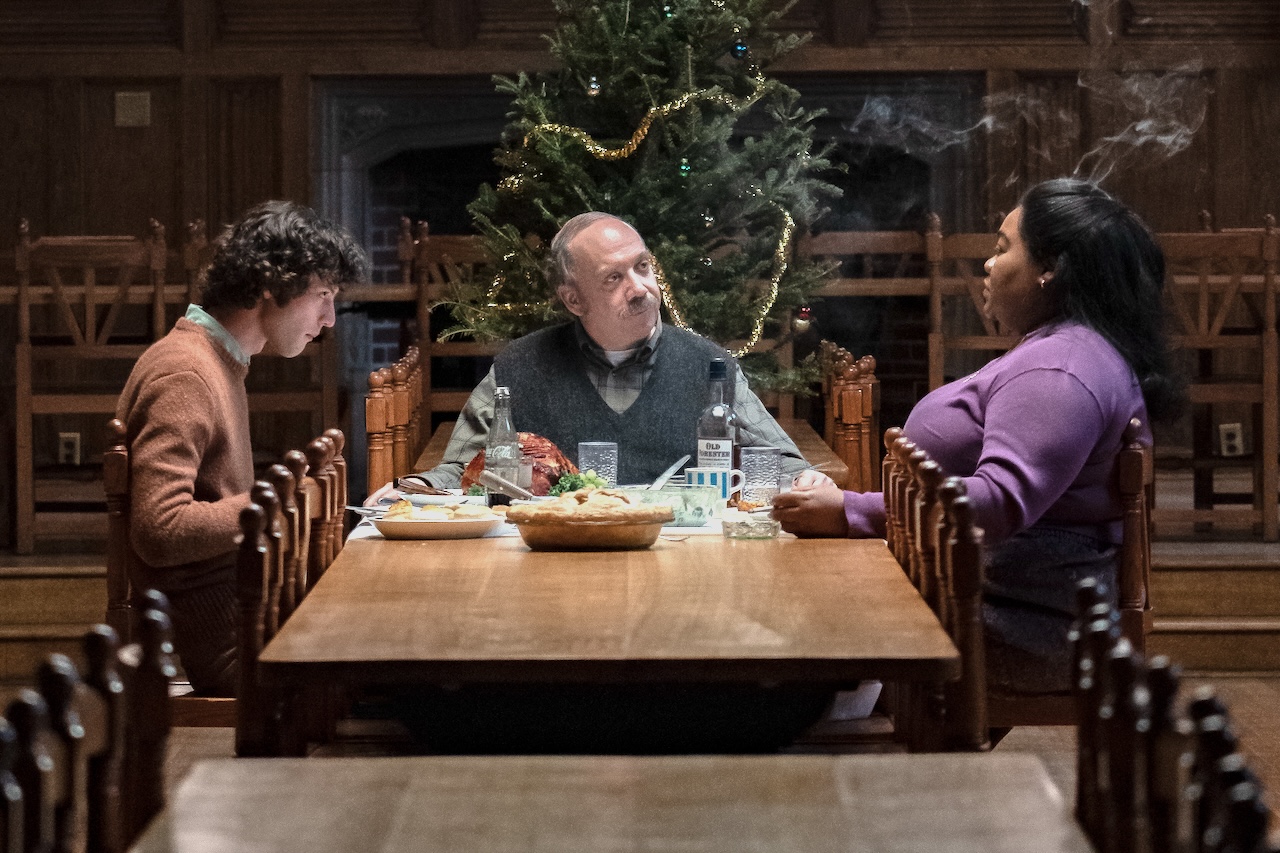The Holdovers is truly a product of the cinema gods coming together. Alexander Payne (Sideways, Election) watched a 1935 French film called Merlusse by director Marcel Pagnol about a group of boarding school boys forced to spend their Christmas holidays with a reviled professor because they have nowhere else to go. The film left an indelible mark on Payne and he set out to tell his own version of the story.
Screenwriter David Hemingson (Whiskey Cavalier, Kitchen Confidential) was working on a TV pilot based on his experiences at a boarding school and his fortuitously script worked its way into Payne’s hands. Hemingson was working on his pilot called Stonehaven before Whiskey Cavalier. “I went through a burst of deeply personal screenwriting because I had been in television for so long and I’d been so calibrated to figure out what was most likely going to get on the air.” Predicting what TV show had the highest chance of being greenlit by a studio is a game of Russian roulette, so David simply wrote from his heart. “I wrote this very autobiographical pilot called which is about my youth as this scholarship kid at this private school in Connecticut where my dad had been teaching. My parents were estranged. I hadn’t seen my dad in years, and my mother thought it was a good idea because I was getting the stuffing kicked out of me at my public school,” adds the writer.
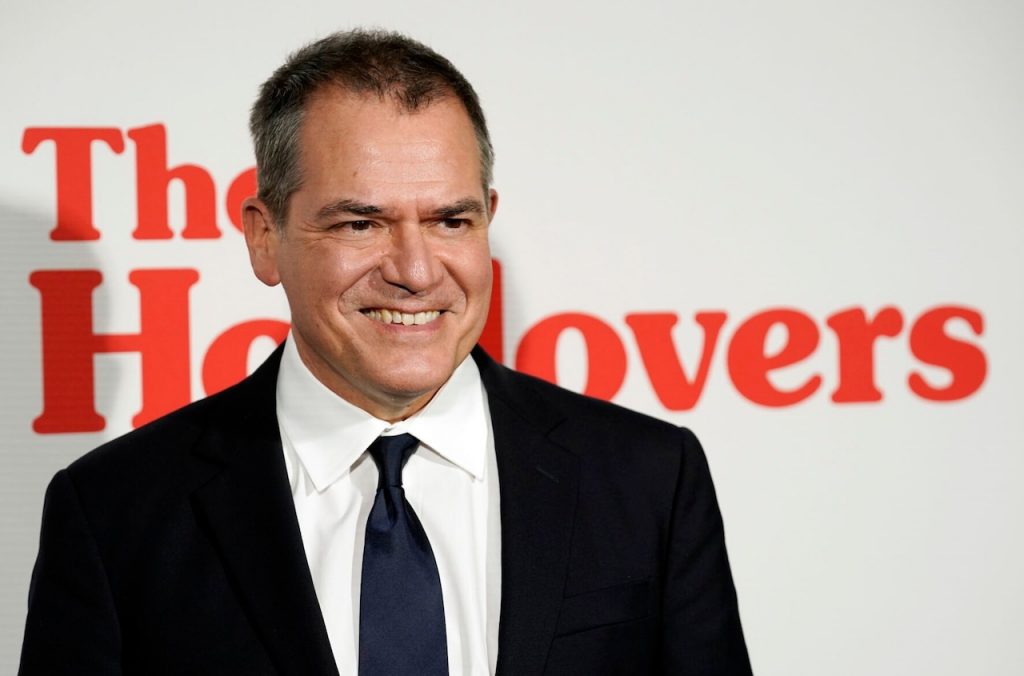
To augment his research, the writer read as many Thomas Hughes novels as he could to shape his views on English boarding school life. Hughes’ Tom Brown novels set the character framework. “I went into my prep school experience expecting that it was extremely different. It was the friction between these kids, the romantic idealization, and my relationship with my father that propelled the pilot.” David’s agent, now manager, read Stonehaven, but couldn’t immediately see a market for it. Unbeknown to Hemingson, his manager gave the pilot to another client of his, who in turn, forwarded it to Alexander Payne.
“Alexander had the idea for an ocularly challenge professor at a boarding school kicking around in his head for twelve years before he read my pilot calls me out of the blue,” says Hemingson of these serendipitous moments. Payne simply asked Hemingson if he wanted to write a movie in the same world as his TV pilot. “The Holdovers is the collision of these two wells.”
The Main Characters Of The Holdovers
“The movie was born of my understanding of the dynamics and the culture of boarding schools, and my desire to tell a specific story about three characters. Alexander added the plot trajectory of the story.”
The Holdovers begins with a brusque professor Paul Hunham (Paul Giamatti) who’s marooned at Barton boarding school over Christmas. He mainly interacts with Angus Tully (Dominic Sessa), a troubled but smart student who’s one disciplinary infraction away from being sent to military school. Later, we discover that Paul and Angus have been lying to each other by “misrepresenting the larger truth of their lives. I mined this fricative relationship between the two of them,” says Hemingson.
Mary Lamb (Da’Vine Joy Randolph) is the school chef who carries more than her fair share of grief and sorrow. “She has such primacy and integrity.”
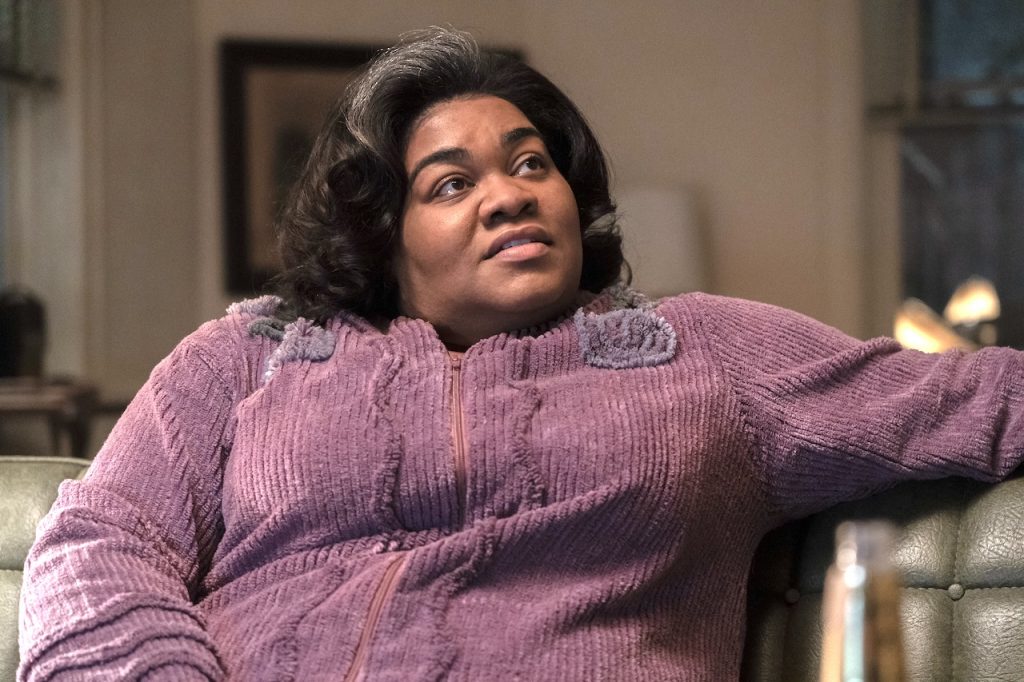
Mary Lamb (Da’Vine Joy Randolph) Photo by Seacia Pavao
Mary is mired in grief as she grapples with the death of her son Curtis in Vietnam. “I don’t need you feeling sorry for me,” she asserts. She’s processing the horrible truth of what happened, but her inner strength prevails. Many of Mary’s traits were inspired by Hemingson’s mother.
“Paul is kind of a pig at the beginning and he’s grinding these kids when he talks to principal Dr. Hardy Woodrup (Andrew Garman) about not sacrificing the teachers’ integrity at the altar of these kids’ entitlement.” Hunham genuinely believes this.
Angus enjoys playing with fire with his fate. “I think that he has a problem governing his behavior like a lot of adolescents do. We take his armor off and the two of them are sitting at that table and when we hear that monologue where Angus opens up to Paul. They get to the point where they can be truthful with one another and kind of fall in love.”
Despite Paul’s sense of self-elation, he is a true teacher to Angus as well as the other boys. He’s not just projecting his own bad life onto the kids, but he’s actually teaching them about life. And that’s of where his likeability comes from.
Mary is the bridge that facilitates the bond between Paul and Angus. “She’s also on her own journey and they’re helping her.” Despite her deep well of compassion, Mary has her limits and appreciates that adolescent boys misbehave. Hemingson cites a scene when they’re in the kitchen and he’s peeling the potatoes. He says, “Thank you for this. I find it to be very therapeutic and she replies, ‘Yeah try doing it for three hundred little shits who don’t appreciate it at all and tell me how therapeutic it is.”
In another scenes they’re arguing whether they should go to the Christmas party. Angus wants to go, but Paul doesn’t. He doesn’t consider it to be a “field trip.” Mary scolds Paul. “If you’re too chicken shit to go to the party that’s one thing, but don’t spoil it for the little asshole.” She calls each out on their pettiness and refuses to pick favorites. Eventually, she’s pushed to the brink and declares she needs a break from them.
“I would create points of friction for the characters and create a crisis for them like Angus’ arm dislocating.” When they’re at the hospital, Angus lies for Paul so he doesn’t get fired. “They share that intimacy and that’s funny. It’s real and it’s heightened at the same time. But then, Angus turns on Paul and he says, ‘Now you got to do something for me.’ Paul retorts, ‘Don’t you try to leverage me Mr Tully.’” It’s this constant push-pull that elevates both the drama and comedy in the story.
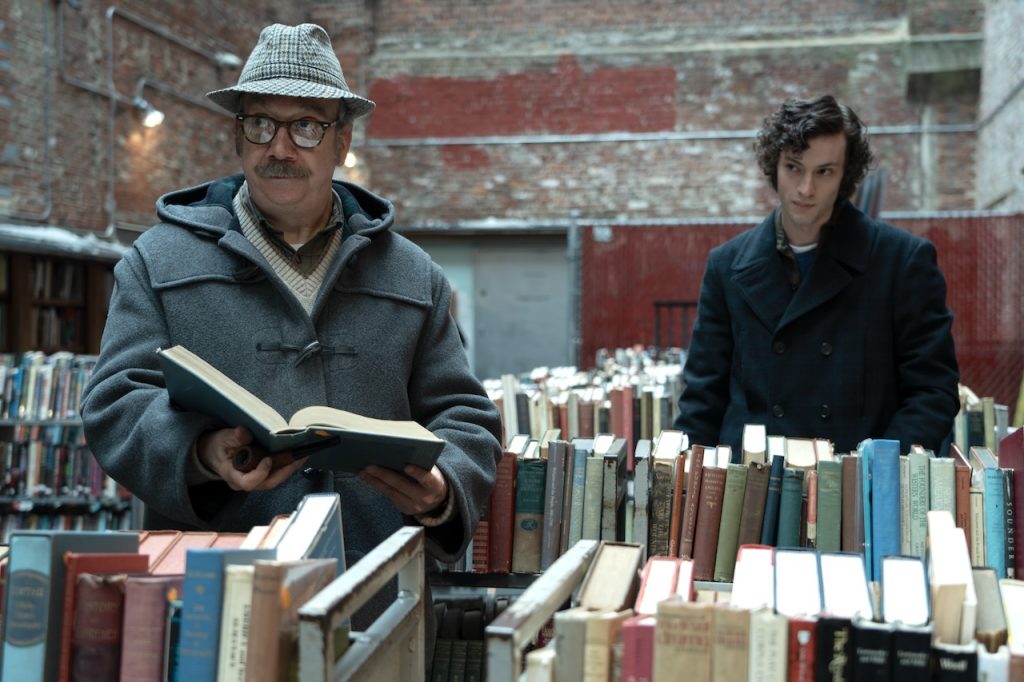
Paul Hunham (Paul Giamatti) & Angus Tully (Dominic Sassa) Photo by Seacia Pavao
Despite Paul and Angus bonding, they never fully trust each other, and therefore can’t become fully-bonded. Neither can let their guard down. “They’ll kind of ally with each other, then betray each other. But the more you create that fiction, the more it drives additional intimacy and creates space for conversation and backstory,” says Hemingson.
“I love getting backstory out through moments of crisis or betrayal and reconciliation because people tend to reveal themselves when they feel like there’s been some cathartic moment.”
On Theme
The Holdovers explores a range of themes including abandonment, grief, loneliness, and family. The moniker “holdovers” performs double duty. It refers to the emotional baggage that Paul, Angus, and Mary “hold over” from their past experiences. The main emotional arc of these three characters is the pursuit of healing. They need to release their “hold over” emotions that no longer serve them.
Mary has a deep emotional tie to the ghost of her son. Paul didn’t complete his college degree and Angus’ parents have abandoned him to go on a honeymoon.
The Holdovers delights with its nuanced blend of drama and comedy in equal measures. “I always like to play the drama against the comedy in my work. If you play it real and you amplify a little bit, you let the characters air out some of their personality and it becomes funny organically without having to reach,” explains Hemingson.
On Casting
“I wrote Hunham’s part for Paul Giamatti,” states David Hemingson. “I think about his rhythm and his strengths. I was thinking about what I love to see Hunham do. Giamatti amplified and grounded his character with a Baroque profanity.” In the wrong hands, a flawed character with such a big personality could have become cartoonish.
“Giamatti understood how to play the character. He never made a choice that wasn’t real. He never leaned into a joke. He was always playing the drama against the comedy. He took the character seriously all the way through.”
Da’Vine Joy Randolph understood that much of Mary Lamb’s anguish and despair stemmed from her anger. “Da’Vine completely understood the pain, the rage and the steadfastness she had in getting her job done. She is reacting in the way that seems completely organic and appropriate to that character in that moment,” adds the writer.
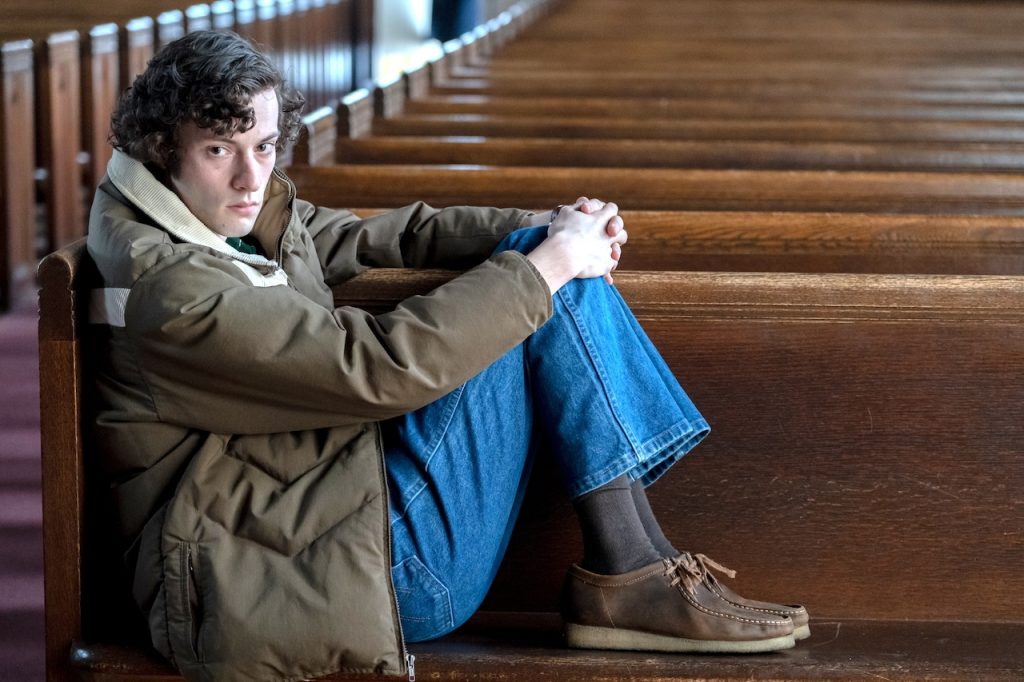
Angus Tully (Dominic Sessa) Photo by Seacia Pavao
Dominic Sassa embraced the role of the unruly Angus Tully with pathos, vulnerability, and realism. He’s in emotional pain which he allows to sabotage his academic efforts.
“What the screenplay gave to the actors was just a blueprint of real emotions and a trajectory that made sense and moments that were fun to play. I try to write within these characters a degree of affection, but also, they’ve got to be a little suspicious of each other. They’ve got to feel each other out, betray each other, and then invalidate each other.”
On Time & Influences
The boarding school experience of the 1970s is integral to shaping the mood and feel of The Holdovers. David Hemingson describes it as a “lo-fi narrative without the distraction of cell phones and the internet.”
“Alexander Payne and I started talking about The Holdovers in 2018. The 1970s witnessed the start of social tension arising from huge income inequality. Racial injustice is percolating. Despite the current parallels, I want to show this place that was both frozen in time and timeless. I wouldn’t say there was an innocence to it, but I wanted it to be more analog to more directly deal with human relationships relatively free of mechanical distractions.”
David Hemingson watched as many Hal Ashby and Robert Altman films as he could to contour the feel of The Holdovers. He also sneaked in a few Milos Forman and Francis Ford Coppola movies to inspire the tone.
The writer also considers the film Bande à part by Jean-Luc Godard as impactful. “It really hit me because of the almost loose fun improvisational components that come up against a more serious story. I started looking at the great filmmakers who changed the genre and redefined film in the 70s and that’s another reason why I feel like the 70s were a perfect time to set it.”
“Humanity wasn’t sanded and polished and zipped into a superhero costume.”
After The Closing Credits
The Holdovers ends on a downbeat note with Paul losing his job. We also know there is life for these characters after the film naturally ends. Angus and Paul are hardly best of friends and Mary still hasn’t found peace.
“The original ending of the movie went back to Mary sitting at her desk and seeing these two coffee mugs. She walks out and sits in Paul’s chair (the chair that she’s never seen him occupy at the teacher’s table), lights a cigarette looks out the window.”
“She continues to work there and she puts all of her time love and energy into her into her nephew. I think Angus dodges military school. He actually goes to college and he doesn’t make any major life mistakes. I think he seeks Paul out at a certain point (about twelve years past the end of the movie) and I think Paul does end up writing his monograph.”
